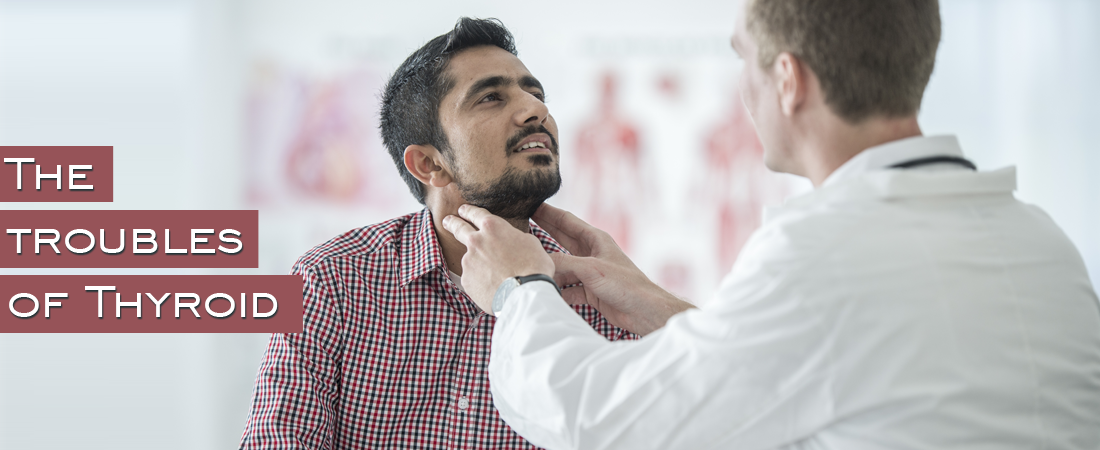Thyroid diseases have been around for generations. But only of recent, almost every third person (mainly women), claims to have been affected by an abnormally functioning thyroid gland. So, what exactly does this gland do? And why does it have such a great effect of the body – find all the information you need, below.
The thyroid is a small butterfly-shaped gland located at the base of the neck. It serves a crucial function in the endocrine system, by producing a variety of hormonesthat maintain the body’s metabolism (the process of creating and using energy). These hormones regulate many vital body functions likeheart rate, body weight, muscle strength, breathing, menstrual cycles, cholesterol levels etc. Several disorders arise with the functioning of the thyroid, those being:
- Hyperthyroidism – when the thyroid gland makes more thyroid hormones than the body requires
- Hypothyroidism – when the thyroid gland does not make enough thyroid hormones
- Goiter – enlargement of the thyroid gland
- Thyroid nodules – lumps in the thyroid gland
- Thyroiditis – swelling of the thyroid
- Thyroid cancer
Here’s a closer look at these common thyroid malfunctions:
Hyperthyroidism
Hyperthyroidism is a condition where the thyroid is overactive and produces excessive amounts of hormones. In this case, the body’s processes speed up, causing nervousness, anxiety, rapid heartbeat, hand tremors, excessive sweating, fatigue, bulging eyes, weight loss, and sleep problems, among other symptoms.
Graves’ disease is the most common cause of hyperthyroidism. It is an autoimmune disorder that results in the overproduction of thyroid hormones. This disease is hereditary and is most commonly found in women. Other risk factors include stress, pregnancy, and smoking.
Hyperthyroidism also may be caused by nodules, goiters, thyroiditis and overconsumption of iodine (in foods and supplements).
Hyperthyroidism is diagnosed based on symptoms, physical exams, and blood tests. Doctors may also order an ultrasound or a nuclear medicine scan of the thyroid to see if it has nodules, or whether it is inflamed or overactive.
Hypothyroidism
Hypothyroidism stems from an underproduction of thyroid hormones. This condition slows down the body’s metabolism and includes symptoms like constipation, muscle weakness, weight gain, joint pain, depression, tiredness, dry skin, thinning hair, slow heart rate, etc.
The most common cause of hypothyroidism is Hashimoto’s disease. This is an autoimmune disease that causes the immune system to mistakenly attack the thyroid, causing damage to the tissue. Sometimes, radioactive iodine (for treatment of hyperthyroidism)and surgical removal of the thyroid gland can lead to hypothyroidism.
Hypothyroidism can often be diagnosed with a simple blood test.
Goiter
A goiter is a swelling in the neck. It may be large enough that to be seen or felt. A very large goiter can also cause a tight feeling in the throat, coughing, or problems swallowing or breathing.It is usually caused by iodine deficiency in the diet. Most of the time, goiters don’t require treatment, and may shrink away on their own. In extreme cases, a surgery may be required to remove a part or most of the thyroid.
Thyroid Nodules
A thyroid nodule is a swelling that forms in or on the thyroid gland. It may be solid, or filled with fluid or blood. As with other thyroid-related problems, nodules are more common in women than men. Nodules do not show any major symptoms. In certain cases, the swelling may get so large, that it causes swallowing and breathing problems. Nodules also tend to cause hyperthyroidism. Usually, nodules can be detected through a physical exam or ultrasound. Treatments aren’t required in most cases. However, surgery or radio iodine can be used in extreme scenarios.
Thyroiditis
Thyroiditis refers to an inflammation of the thyroid. It occurs when the body produces antibodies that attack the thyroid. It is caused by autoimmune diseases, like type 1 diabetes and rheumatoid arthritis, genetics and viral or bacterial infection. Treatment for thyroiditis depends on the phase of the disease and the symptoms that can be seen.
Thyroid Cancer
Thyroid cancer occurs when cancer cells form from the tissues of the gland. Most people with thyroid cancer have a thyroid nodule that does not show any symptoms. The main treatment for thyroid cancer is surgery to take out the whole thyroid gland or as much of it as can be safely removed. Doctors may also use radioiodine therapy after surgery to destroy any thyroid cancer cells that were not removed during surgery or that have spread to other parts of the body.
Why are men less likely than women to have problems with their thyroid?
Though not completely verified, researchers suspect it has to do with the differences in the immune system. Women have been found to have a more intense immune response to vaccinations, trauma, and infections, compared to men. Hence, it is likely that this highly active immune system puts women at risk for more thyroid disease.
Early detection can help control thyroid diseases. Contact Kokilaben Dhirubhai Ambani Hospital’s Thyroid Clinic and book your appointment now.


